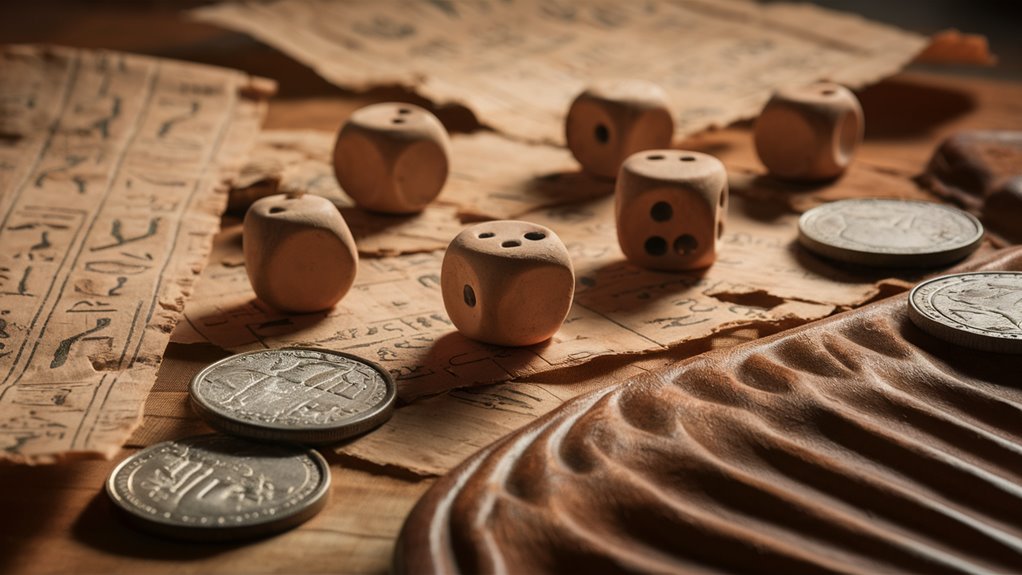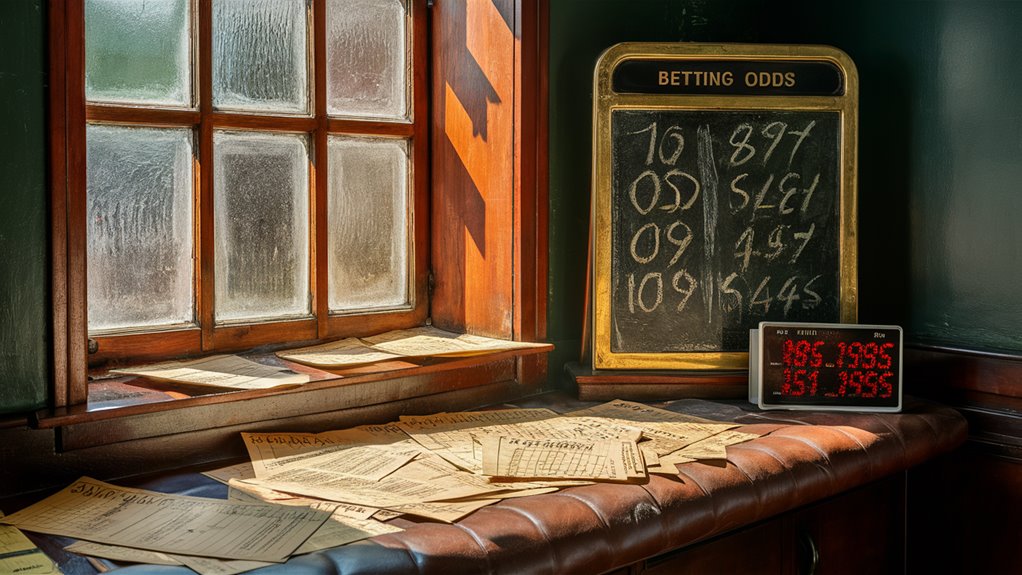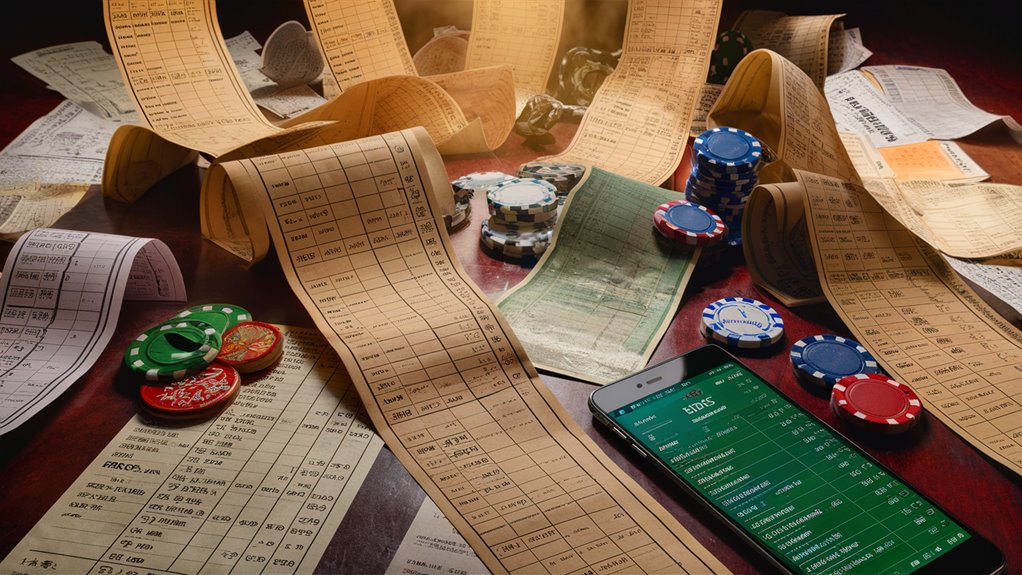You know how language keeps changing with the times? Well, betting lingo is no exception. It’s pretty fascinating when you think about it – from ancient Romans tossing dice and using Latin terms to modern-day crypto traders talking about “HODLing” their bets. Let’s break down this incredible journey of betting vocabulary.
Back in the day, people would gather around dice games, using words that would sound completely foreign to us now. Fast forward to today, and we’re throwing around terms like “parlay” and “spread” like they’re everyday conversation. It’s kind of like how your grandparents might not understand what “streaming” means, but they knew all about “broadcasting.”
The really interesting part is how betting terms reflect our culture. Take the 바카라 먹튀사이트 word “stake” for instance. It comes from literally putting something at stake, like how medieval gamblers would physically place their valuables on the table. Pretty straightforward, right?
Modern betting language is a whole different ball game. With online gambling and sports betting becoming mainstream, we’ve developed this rich mix of traditional gambling terms, tech speak, and social media slang. It’s like a living, breathing dictionary that keeps growing every year.
What’s really cool is how different cultures add their own flavor to betting vocabulary. Walk into a casino in Macau, Las Vegas, or Monte Carlo, and you’ll hear a totally unique blend of local expressions mixed with universal betting terms. Think of it as a linguistic melting pot where old meets new, east meets west, and tradition meets technology.
Ancient Gambling Terms and Origins

You know what’s fascinating about gambling? Its language has incredibly deep roots, going all the way back to ancient times.
Think about it – every time you roll dice or place a bet, you’re actually using words and phrases that people used thousands of years ago.
Take the Romans, for instance. When they gathered around to play games of chance, they called their dice “alea” – a word that’s still echoing in our modern casino halls.
They also gave us the word “sponsor,” which started as a way to describe making a serious bet. Pretty cool, right?
If we hop over to ancient Egypt, their hieroglyphs tell us stories about gambling that go beyond just playing games.
The popular board game “senet” wasn’t just about moving pieces around – it developed its own rich language about betting and destiny. It’s like their version of today’s poker lingo.
The Greeks left their mark too. Their word “kubos” for dice eventually gave us “cube,” and it spread like wildfire across Europe, shaping how people talked about games of chance for centuries to come.
And let’s not forget about Asia. Ancient Chinese games like “pai gow” and “fan-tan” weren’t just pastimes – they created entire vocabularies around different ways of betting.
Over in India, the Sanskrit word “dyuta” started a chain reaction, influencing how people talked about gambling throughout South and Southeast Asia.
When you look at it this way, every bet you place or game you play carries a little piece of history.
It’s amazing how these ancient terms have stuck around, shaping the way we talk about gambling even today.
Traditional Bookmaking Vocabulary

You know how every field has its own special language? Well, traditional bookmaking is no different, with its fascinating vocabulary that’s been around for hundreds of years.
Let me break down some of these terms that you might hear at the track or in betting circles.
Think of “chalk” as the star player everyone expects to win – that’s your favorite. On the flip side, “dogs” are the underdogs, those long shots that could make you rich if they pull off an upset. When bookmakers 먹튀사이트 대처하는방법 talk about “juice,” they’re referring to their commission, kind of like a service fee for handling your bet.
A lot of these terms actually came from the old days of horse racing and underground betting spots. Back then, people needed to be discreet, so they developed this sort of secret language. Pretty clever, right?
The math side of betting has its own vocabulary too. Ever heard of “vigorish” or “vig”? That’s the house’s advantage, their way of making sure they turn a profit.
When someone talks about “laying the points,” they’re giving the weaker team a head start to even things out. And those smart cookies who seem to win all the time? They’re called “sharps” in betting circles.
Some classic terms are still going strong today. You’ve got your “runners” hustling to place bets, “steam” when the odds suddenly shift, and “beards” who place bets for other people (kind of like their secret agents).
These words stick around because they just work – they’re quick ways to explain complicated betting stuff. So if you’re getting into sports betting, learning these terms isn’t just helpful, it’s pretty much essential for understanding how everything works.
Digital Age Betting Language

Let’s dive into how betting language has changed in our digital world. You know how technology keeps evolving? Well, the way we talk about betting has completely transformed alongside it.
These days, when you’re placing bets online, you’ll run into all sorts of new terms that would’ve seemed like science fiction just a few years ago. Take “cash out” for example – it’s pretty neat actually.
Instead of waiting until the end of a game, you can grab your winnings early if things are looking good, or cut your losses if they’re not.
The tech side of betting has brought a whole new vocabulary into play. Ever tried setting up a betting account? You’ll quickly become familiar with things like push notifications keeping you updated on your bets, and that two-step verification process that helps keep your account safe.
And let’s not forget about payment methods – from e-wallets to cryptocurrency, the options just keep growing.
Virtual sports have added their own flavor to betting language. If you’re into this kind of betting, you’ll need to get comfortable with terms like RNG (that’s Random Number Generator for the newcomers) and simulation odds.
It’s quite different from traditional sports betting, but just as exciting for many players.
The social aspect of betting has gotten really interesting too. Now we’ve got things like copy betting, where you can follow successful bettors and mirror their moves, and social trading platforms where everyone shares tips and strategies.
It’s like having a whole community of fellow bettors right at your fingertips.
Safety features have brought their own terminology too. Terms like deposit limits and self-exclusion mightn’t sound exciting, but they’re super important for keeping betting fun and manageable.
And for the tech-savvy bettors out there, features like bet builders and accumulator calculators have become everyday tools, making complex bets much easier to handle.
Global Betting Terminology Convergence

You know how betting language used to be all over the place? Well, things have really changed lately.
Take a look at any live betting website these days, and you’ll notice something interesting – they’re all starting to look and sound pretty similar. It’s actually quite fascinating how terms like “cash out” and “in-play” have become universal favorites, replacing all those local phrases we used to hear.
Think of it like how everyone now uses “Google” as a verb, no matter where they’re from. The same thing’s happening in betting.
Thanks to social media and online betting communities, we’re all basically speaking the same betting language now. Whether you’re placing bets in London, Las Vegas, or Sydney, you’ll run into familiar terms that make you feel right at home.
This shift has made life so much easier for bettors who like to explore different markets around the world. Remember when you’d to practically learn a new language just to place a bet in another country?
Those days are pretty much gone. Now, if you understand basic betting terms in one place, you can probably navigate betting sites anywhere else without too much trouble.
Modern Slang in Gambling

Ever wonder how gambling slang has evolved in our digital age? Well, it’s pretty fascinating how players communicate these days, both in person and online.
Think of it like a secret language that’s constantly growing and changing.
Let’s start with the classics you’ll hear around any poker table. High-rollers get called “whales” because, you know, they’re the big fish in the pond.
Speaking of fish, that’s what folks call newbies who mightn’t know what they’re doing yet. And when someone starts making wild bets after losing? That’s called being “on tilt” – we’ve all been there!
Online gambling has really shaken things up with its own vocabulary. You might catch people using “donk” for someone who’s not exactly a poker genius, while the term “shark” gets thrown around for those skilled players who seem to win every hand.
Social media and live streaming have only sped up how these terms spread and evolve.
Ever sat there nervously watching your bet play out? That’s what players call “sweating” – and trust me, it’s a perfect description!
When your cards completely miss what you need, that’s a “brick” (and it feels just as hard as it sounds). Some players like to “run it twice” to take the edge off the stress, dealing the last cards two times to spread out their luck.
Sports betting brings its own flavor to the table. The “chalk” play is going with the favorite – pretty straightforward stuff.
“Square” bettors are your everyday folks placing casual bets, while “sharps” are those serious players who crunch numbers for a living.
Then there’s crypto gambling, which really brings some colorful terms to the mix. You’ve got “degens” making super aggressive trades, and people betting with “FOMO” because they can’t stand missing out.
Watch out for the dreaded “rug pull” when sketchy gambling sites vanish with everyone’s money, and keep an eye out for those “diamond hands” who stick to their bets no matter what.
It’s amazing how gambling language keeps evolving with new technology and younger players joining the scene. Pretty soon, we’ll probably have a whole new set of terms to learn!
Common Questions
How Do Gambling Terminologies Differ Between Card Games and Sports Betting?
You know how every hobby has its own special language? Well, gambling is no different, and it’s actually pretty interesting how card games and sports betting each have their own unique vocabulary. Let me break it down for you.
When you’re sitting at a poker table, you’ll hear players tossing around terms like “hit” when they want another card, “fold” when they’re giving up on a hand, or “ante” when they’re putting in that first bet. It’s almost like a secret code that everyone at the table understands.
Switch over to a sports bar during a big game, and you’ll catch people talking about completely different stuff. They’re busy discussing “spreads” (the predicted winning margin), “moneylines” (straight-up winner bets), and “parlays” (combining multiple bets for a bigger payout).
Think of it like speaking two different dialects of the same language. A poker pro might feel lost in a conversation about point spreads, while a sports betting enthusiast might scratch their head at terms like “pocket rockets” or “river card.” But that’s what makes each type of gambling unique – they’ve developed their own mini-languages to match how the games are played.
When Did Betting Exchanges First Introduce Their Unique Trading Vocabulary?
You know, the unique language of betting exchanges really took shape around the turn of the millennium, specifically in 2000. That’s when Betfair burst onto the scene and completely changed how we talk about betting. Before then, most people weren’t familiar with terms like “backing” or “laying” bets, but these phrases quickly became second nature to anyone using these new platforms.
Think of it like learning a new dialect – at first, all these terms might sound like a foreign language. “Matched bets,” “in-play trading,” and “greening up” probably had people scratching their heads initially. But just as we naturally pick up local slang when moving to a new city, bettors quickly adapted to this fresh vocabulary.
It’s interesting to note that while traditional bookmakers had their own terminology, betting exchanges created an entirely new way of talking about gambling. They basically borrowed concepts from the stock market and applied them to sports betting, which is why you’ll hear terms that sound more like Wall Street than William Hill.
Why Do Some Betting Terms Vary Significantly Between English-Speaking Countries?
Have you ever wondered why placing a bet in London feels like speaking a different language compared to doing the same in Las Vegas? Well, it’s actually pretty fascinating how betting lingo has evolved so differently across English-speaking countries.
You know how each country has its own unique sports culture, right? That’s a big part of it. Think about it – while Americans are all about baseball and football, Brits are crazy for cricket and soccer. These different sporting preferences naturally led to their own special betting vocabularies over time.
But there’s more to the story than just sports. Each country’s gambling scene developed in its own bubble, so to speak. While Vegas was becoming the gambling capital of America, Australia was creating its own unique betting culture around horse racing and rugby. These separate paths meant that different terms and phrases took root in each place.
Culture plays a huge role too. Just like how British and American English split on words like “lift” versus “elevator,” betting terms followed similar patterns. Plus, local laws and regulations shaped how people talked about gambling – when something’s restricted, people often come up with creative ways to discuss it.
The really interesting part? Even today, with the internet connecting gamblers worldwide, these regional differences stick around. It’s like a little piece of each country’s gambling heritage that refuses to be standardized, adding character to the global betting scene.
How Have Mobile Betting Apps Influenced the Creation of New Betting Terms?
You know, it’s fascinating how mobile betting apps have totally changed the way we talk about betting. These days, you’ll hear all sorts of new terms that didn’t exist before smartphones came along. Take “cash out” for instance – a feature that lets you grab your winnings before a game even ends. Pretty cool, right?
Then there’s the whole world of “boost” offers, where apps sweeten the odds to make certain bets more tempting. And let’s not forget “in-play” betting, which lets you place bets while the action is happening live. Since we’re all tapping and swiping on our phones now, these apps have even created their own shorthand language, making it super quick to place bets with just a few touches on your screen.
The betting world has definitely gotten more casual and accessible, with apps introducing terms that feel more like everyday language rather than complicated gambling jargon. It’s like texting changed how we communicate with friends, and now betting apps are doing the same thing for sports wagering.
What Role Does Mathematics Play in Modern Betting Terminology Development?
You know, mathematics plays a fascinating role in how betting terms have evolved over time. When you think about it, math is basically the building blocks of modern betting language. Let’s break it down a bit.
Ever notice how naturally we now throw around terms like “probability” and “odds” when talking about betting? That’s no accident. Math has quietly shaped the way we discuss everything from simple bets to complex wagering strategies. In fact, many of our everyday betting terms come straight from statistical concepts.
Take expected value, for instance. It might sound complicated, but it’s really just a way to figure out if a bet is worth your while. Bookmakers and bettors alike use these mathematical principles to create and understand betting terminology that’s both precise and practical.
The cool thing is, even if you’re not a math whiz, you’ve probably used math-based betting terms without realizing it. When someone talks about “positive odds” or “negative odds,” they’re actually using mathematical concepts that help make betting language more accurate and useful.
The whole betting vocabulary has gotten more sophisticated over time, but it’s all built on simple mathematical foundations. Think of it as a bridge between casual betting chat and serious statistical analysis, making it easier for everyone to understand the game, whether you’re a rookie or a seasoned pro.


